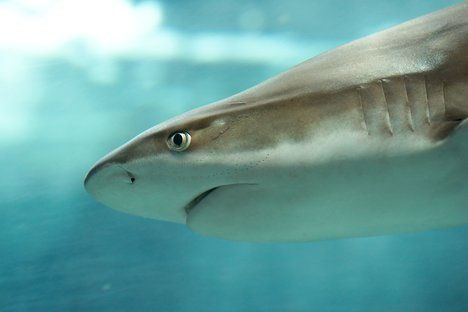Baby Sharks Concerned With Evolution Eat Their Brothers in The Womb

Demian Chapman and associates at New York's Stony Brook University have uncovered a new level of sibling rivalry, as well as natural selection, in shark reproduction. In a new study, Chapman has found that in shark litters as big as twelve shark fetuses, only two from the same father will survive because they will eat all the rest. How this happens is easily explained by evolutionary theory.
Evolutionary theory promulgates that only offspring large and strong enough to fend for themselves at birth will be "selected for" or survive their time in the womb with their siblings. In terms of the evolutionary theory of natural selection, the siblings are all competitors and the mother's womb is a limiting environment. Limiting environments, or environments without unlimited supplies of food, are also selecting environments. Natural selection ensures that only effective genes- like ones that code for perseverance, predatory behavior or even camouflage with the environment- remain in the gene pool.
Given that a litter of up to twelve baby sharks shares the limited environment at one time, it would only make sense that the strongest and biggest outcompete the weakest for nutrients. As a result of being stronger, those sharks devour the weakest, to make more room for themselves to develop and ensure they continue to get more nutrients.
The major piece of this event is that female sharks mate with, and carry the offspring of, multiple male sharks. Chapman has found that the two surviving sharks will share the same father, but the reason for that is not clear. Chapman concedes that because shark mating rituals are often violent, beginning with a male biting a female, the females have little choice over who would be a suitable mate to give her offspring traits to survive the ravages of life as a shark after birth. In a way, the fetuses take care of selection for themselves and get rid of the weaker sharks who are perhaps the offspring of male sharks whose genes are not evolutionarily favorable.
Sharks are among some of the only marine species that carryout viviparous births, or births to live young. Most marine life will lay eggs, and those that are not eaten by other animals, will survive. However, because sharks develop in utero, there are no eggs for others to eat and instead fellow sharks will bolster survival of the fittest animals for themeselves. The novelty of Chapman's findings lies in the rarity of viviparous births under the sea, as well as what the young sharks are doin gin utero to assure the survival of their species.
Chapman has found that this phenomenon is even seen among non-aggressive sharks, like sand tiger sharks. It is safe to say that sharks are very concerned with the contents of their gene pool, as they are regulating it at conception.
Published by Medicaldaily.com



























